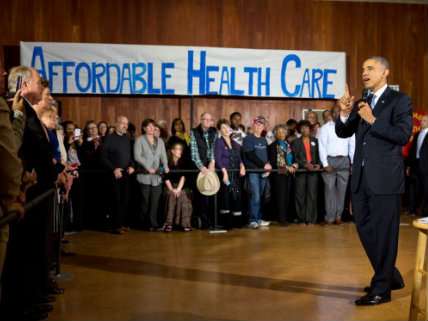The High Cost of Cheap Health Insurance

Here's what the Obama administration wants you to know about health insurance premiums under Obamacare: On average, people who selected subsidized insurance plans through the federally-run insurance exchange paid $82 a month, out of their own pockets, for health insurance. People who selected "silver" health plans—the most popular tier of coverage offered in the exchange—paid less: $69 per month, on average. Almost 70 percent of the people who signed up for subsidized plans through the federal exchanges are paying less than $100.
Those are the average premium prices that the Obama administration highlights in a press release touting a new government report on Obamacare and health premiums.
But there are several things to remember about those figures.
One is that they're incomplete. The data released by the administration doesn't account for premiums in the 14 states that ran their own exchanges this year.
Another is that those averages conceal an awful lot of variation. Even with the federally run exchange covering the majority of states, Obamacare varies quite a bit from state to state. Out of pocket insurance costs in Mississippi averaged about $23 a month, but came in at $148 in New Jersey. About a third of people buying subsidized coverage through the federal marketplace were paying more than $100. And the report focuses on the majority of participating individuals who bought subsidized coverage: 14 percent of people who selected plans in the federal exchange through the end of open enrollment got no tax credits at all.
That's another thing to remember: The administration's premium averages are based on out-of-pocket costs after the law's tax credits and subsidies are factored in. Those subsidies end up offsetting quite a bit of the cost of insurance under Obamacare. But if you strip away the subsidies, individual market health insurance has, on average, become significantly more expensive in the wake of Obamacare, according to a newly published analysis by the Manhattan Institute.
Relying on a 3,137 county comparison of the five cheapest individual plans available prior to Obamacare with the five cheapest plans through the exchanges, the study by health policy fellow Yevgeniy Feyman found that, on average, premiums were up 49 percent under Obamacare. Again, that's an average, and it masks some variation—in New York, which had unusually restrictive, badly designed health insurance market rules prior to Obamacare, premiums are actually down quite a bit—but it indicates that the overall trend for unsubsidized premiums is up.
The difference, then, is being made up by federal subsidies. According to the administration's report, those subsidies are carrying 76 percent of the total cost of subsidized insurance plans selected in the federal exchange. The out-of-pocket average is $82. But the actual average premium price, without subsidies, is $346.
To the extent that insurance is relatively cheap, it's because taxpayers are footing a big chunk of the bill. Obamacare didn't reduce the price of insurance; if anything it raised it—and then used tax revenues to cover the difference.
That's frequently how subsidies work—they lower the out-of-pocket price tag, but, by separating consumers from meaningful price signals, they also distort markets in ways that drive up the overall cost, leaving the public to pick up the ever-growing tab.
There's already evidence that this is happening with Obamacare. As the Los Angeles Times reports today, "while the generous subsidies helped consumers, they also risk inflating the new health law's price tag in its first year." If premiums and subsidy levels in the state-run exchanges that were left out of the report generally match up with the federal government, then the Times estimates that the total for subsidies this year could run as high as $16.5 billion—significantly more than the roughly $10 billion estimated by the Congressional Budget Office.
The Obama administration wants everyone to know how cheap insurance is under Obamacare. But they don't really want people to think about how expensive it is to keep it that way.


Show Comments (167)